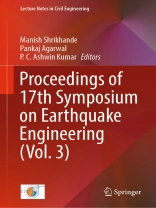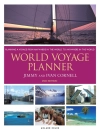This book presents select proceedings of the 17th Symposium on Earthquake Engineering organized by the Department of Earthquake Engineering, Indian Institute of Technology Roorkee. The topics covered in the proceedings include engineering seismology and seismotectonics, earthquake hazard assessment, seismic microzonation and urban planning, dynamic properties of soils and ground response, ground improvement techniques for seismic hazards, computational soil dynamics, dynamic soil–structure interaction, codal provisions on earthquake-resistant design, seismic evaluation and retrofitting of structures, earthquake disaster mitigation and management, and many more. This book also discusses relevant issues related to earthquakes, such as human response and socioeconomic matters, post-earthquake rehabilitation, earthquake engineering education, public awareness, participation and enforcement of building safety laws, and earthquake prediction and early warning system. Thisbook is a valuable reference for researchers and professionals working in the area of earthquake engineering.
Mục lục
Investigation on Influence of Embedment Depth of Shallow Foundation on Seismic Response of Building Considering Soil-Structure Interaction.- Evaluation of Dynamic Properties of MICP Treated Ennore Sand Through Bender Element Test.- Seismic Site Characterization and Ground Response Analysis of Railway Line on Eastern Dedicated Freight Corridor.- Earthquake Induced Damage Assessment of Coal Mine Overburden Dump Slope Using Extended Finite Element Method Coupled With Voronoi Tessellation Scheme.- Preliminary Studies on Developing a Physics-Based Smoothed Particle Hydrodynamics Model for Landslides.- Optimization of Single-track PSC I-Girder for Metro Viaduct.- Effect of Saturated Porous Soil Medium on Seismic Wave Propagation.- Formulation of Response Reduction Factor for Wall Type Bridge Piers.- Estimation of Shear Strain Magnitude Due to Impact Z Section Sheet Pile Driving.- Simulation of Interaction Properties in Confined Masonry Walls at Wall-to-tie-column Interface.- Seismic Design of Periphery RC Beams in Buildings with Large Plan Aspect Ratio.- Probabilistic Mapping of Ground Displacement Hazard.- Risk-targeted Seismic Design of Critical Buildings Using Force-based Method.- Study of Liquefaction Potential at Jaigarh Port Using Standard Penetration Test Data and Consequences: A Case Study.- Seismic Assessment of Deep Tunnel in Near Fault Ground Motion.- Effect of Reinforced Soil Interaction with Other Components on Static and Dynamic Performance of MSE Wall.- Numerical Solution for 1-D Consolidation of Partially Saturated Soil Under Cyclic Loading.- 13Th August 2021 Chenab River Coalescent Disaster: A Geo-Informatics Based Investigation.- Numerical Simulation of Special Moment Resisting Frame with Reduced Beam Section Under Cyclic Load.- Seismic Stability Analysis of Saturated Slope Reinforced with Pervious Anti-slide Piles Subjected to Repeated Shaking Using Shaking Table Tests.- Investigations on Rubber-sand Mixture Reinforced with Geogrid as a Low-cost Geotechnical Seismic Base Isolation Technique.- Performance Evaluation of Saturated Slope Subjected to Repeated Shaking Events Using 1-G Shaking Table Experiments.- Numerical Study on One-dimensional Aperiodic Foundations for Seismic Isolation of Structures.- Fluid-soil-structure Interaction of Offshore Wind Turbine: An Analytical Approach for Natural Frequency Estimation.- Seismic Performance Assessment of Reinforced Concrete Moment Resisting Frame Designed by Force Based Design Method and the Performance Based Plastic Design Method.- Influence of Existing Tunnel-surface Structure Interaction Under Repeated Dynamic Loading Conditions.- Similitude Characteristics Between Small-scale Model and Full-scale Piles Under Dynamic Excitations.- Numerical Simulations and Validation of a Rocking Foundation Model for Seismic Loading.- Experimental Studies on Tunnel-soil Interaction in Partially Saturated Ground Subjected to Repeated Shaking Events Using 1-G Shaking Table Experiments.- Assessment of Liquefaction Potential of Allahabad, India: A Future Smart City.- Seismic Evaluation of Assam Type Building Using Abaqus®.- Suitability of Foam Concrete and Confined Masonry for Retaining Walls Application in Seismically Active Regions: A Review.- Role of Hydrodynamic Forces on the Seismic Response of a Dam.- 2020 Tuipuiral Earthquake Review.- Experimental Investigations on Pervious Concrete Piles in Saturated Ground Under Repeated Shaking Conditions.- Small-strain Shear Stiffness and Strain-dependent Dynamic Properties of Gravel-rubber Mixtures.- Numerical Evaluation of the Seismic Performance of GSI Foundation Systems for Buildings Using Gravel-rubber Mixtures.- A Critical Review on Soil Reliquefaction Resistance Using Physical Modelling Experiments.- Inclusion of Fatigue Checks in Current IS Codes for Monopole and Stack Structures.- Behavior of Monopiles for Offshore Wind Turbines in Clayey Soil for Gulf of Khambhat Region.- Linear Spring Constants of Soil for Pile Groups for the Nuclear Power Plants.- Three-dimensional Slope Stability Under Bidirectional Pseudo-static Seismic Load.- Strength of Masonry Infill RC Frame Influenced by Weak and Strong Type RC Frames.- Drained and Undrained Response of Fully Saturated Specimen in Resonant Column Tests Subjected to Large Number of Torsional Vibrations.- Development of Application Software for Lateral and Vertical Load Carrying Capacity of Piles.- Numerical Analysis of a Rigid Wall Retaining Soil Reinforced With C&D Waste.- Seismic Analysis of Railway Track.- Time Series Analyses of Bhatwari Landslide Triggered by 1991 Uttarkashi Earthquake.- Importance of Multiple Geophysical Tests for Effective Subsurface Profiling.- Dynamic Characterisation and Ground Response Analysis of Clay Soil Profiles.- Effect of Vibration Induced by Dynamic Tests on an Adjacent Building – Finite Element Investigations.- Liquefaction Susceptibility of Bottom Ash Under Cyclic Loading.- Soil-structure Interaction Effect on a Multi-storied Building with Pile Foundation Considering Linear Approach.- Geotechnical Characterisation of Natural Sub-base and Subgrade Material for Pavements.- Response of a Nuclear Containment with Soil Underneath Under Earthquake Excitation.- Numerical Studies of a Laminar Soil Box for Seismic SSI Effects of Nuclear Facilities.- Numerical Derivation of Pressure-impulse Diagrams for a Fixed-end RC Beam Subjected to Blast Loads.- Seismic Evaluation of Building Having Steel-concrete Composite Columns and RC Beams.- Chaos Game Representation of Indian Plate Seismicity.- A Fast Staggered Grid Finite Difference Modelling of Rayleigh Wave.- Calibration of UBC3D-PLM Constitutive Model to Simulate the Dynamic Response of Earthen Embankment Resting on Liquefiable Soil.
Giới thiệu về tác giả
Dr. Manish Shrikhande is Professor and Head of the Department of Earthquake Engineering at Indian Institute of Technology Roorkee. His current research interests are vibration monitoring and control, seismic risk and mitigation, and computational mechanics.
Dr. Pankaj Agarwal is Professor at the Department of Earthquake Engineering, Indian Institute of Technology Roorkee. His research interests are earthquake-resistant design of masonry and RC structures, post-damage assessment survey of earthquake-affected areas, risk assessment, cyclic testing of structures, seismic instrumentation in multi-storied buildings, health monitoring, and damage detection in buildings. He is continuously engaged in research on structurally sound and seismically efficient construction and has published several research papers in national and international journals and conferences/seminars/symposia.
Dr. P. C. Ashwin Kumar is Assistant Professor at the Departmentof Earthquake Engineering, Indian Institute of Technology Roorkee. He has been engaged in teaching and research in earthquake-resistant design of steel structures, development of passive devices for seismic protection, vulnerability assessment, and retrofitting of structures.












